Gil Griffin (centre) with two Fremantle-supporting mates, John Separovich and Gavin Crosthwaite, at the 2013 Grand Final.
Geelong fans, I feel your pain. It’s no fun losing a Grand Final. I’ve been right there with you, seven years ago.
From my seat two rows back from the boundary line, at the city end of the MCG, I sat and watched the scoreboard clock advance and the security guards striding along the wings set for the siren, as my Fremantle Dockers – whom I’d flown all the way from Los Angeles to watch – were going to run out of time.
You feel deflated, disappointed, and maybe a bit angry. But I bet you weren’t as gobsmacked as I was shortly after your team lost. That’s because I arrived back home to be greeted by racial profiling, in the form of a bogus police charge against me.
What a welcome back to America, the country that blithely boasts of having a judicial system in which all its citizens are innocent until proven guilty – except of course, if you’re like me, a black man.
If the case against me could be compared to the premise of a film, it was so implausible, so ludicrous; any respectable Hollywood film studio would have laughed the pitching filmmaker right out the door.
Here’s the plot … a 45-year-old humanities teacher at an elite high school with two Ivy League degrees, a successful 25-year journalistic career and no criminal record inexplicably turns petty thief and vigilante.
He swipes a can of motor oil from a store, defiantly tells a following security guard seeking to detain him “good luck with that,” then punches the guard with a set of keys protruding from his closed fist. The neophyte criminal then speeds off in a getaway car.
Never mind that at the time of the alleged incident, the “suspect in question,” was 35,000 feet in the air – not even in US airspace – returning home from the Grand Final.
But that’s exactly how a 2013 criminal complaint written by the police department in Torrance, California (a Los Angeles suburb) described me: doing something I couldn’t possibly have done, at a place I’ve never been.
Fremantle started that year inconsistently. After making a huge statement by beating the hated Eagles in a Western Derby to start the season, it would later drop a Friday night heartbreaker to Essendon that had me screaming at the TV from across the Pacific.
It was about then I approached Freo and told them of my being a purple tragic, to which the club responded by giving me space on its website to write a recurring column about my living and dying with every kick.
Then in August, sensing possible history in the making and my club winning its first flag, I booked a frequent flyer reward one-way ticket to Melbourne. I’d worry about a return flight later.
I’d used the alleged “getaway car” to visit the home of a fellow Dockers tragic, an Aussie expat from the WA wheat belt, and to watch our boys club eliminate my wife’s team Sydney in the preliminary final. I’ll never forget the text she sent after the siren went: “My heart is broken in a million pieces. Congratulations.”
A mate of mine then working for the AFL helped my wife and me score tickets to the Grand Final. We’d been to one before, back in 2000, when we spent six weeks exploring Australia, but seeing my boys at the ‘G? That meant the world to me.
Even when we didn’t win, even though we couldn’t kick straight to save our lives, I had a phenomenal time in Melbourne, making heaps of new purple friends. I’ll never forget the euphoria of marching with the “Purple Army” from Federation Square to the ‘G.
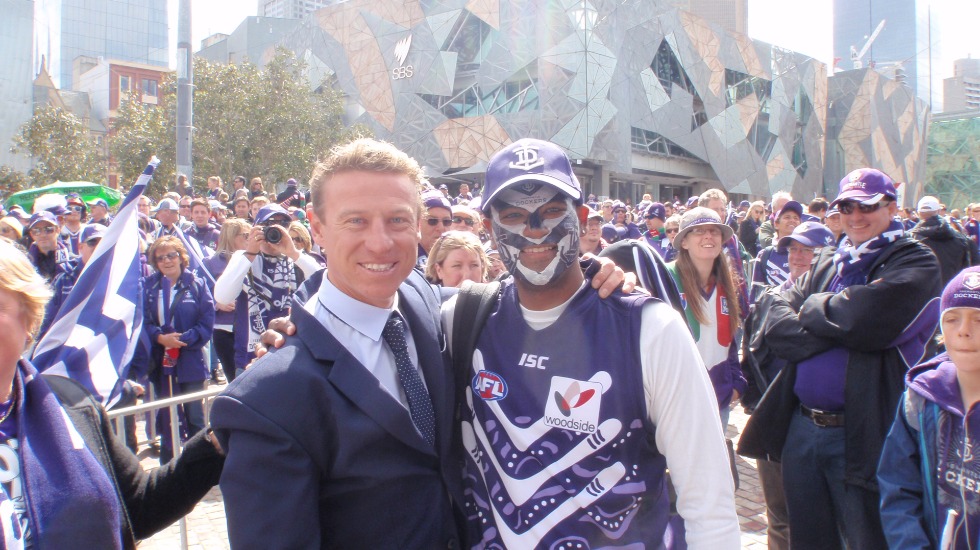
Gil Griffin with Fremantle legend Shaun McManus at Federation Square before the 2013 Grand Final.
At half-time, after the Dockers had kicked a paltry 1.6, I made a wrong turn inside the ground which unexpectedly led me to a room in where I met and chatted with players Kepler Bradley and Anthony Morabito, the mother and aunt of Michael Johnson, and the father of Tendai Mzungu.
They all, after hearing my American accent, recoiled and were blown away to learn that a fan had come from so far away to support them.
But once back in the States, that euphoria of being a purple fan gave way to the realities of being a black man.
It started with a letter I got from Torrance Police. Late on a Friday night, I read the jarring words: “a judge has issued a warrant for your arrest.”
I thought it was a practical joke.
PLEASE HELP US CONTINUE TO THRIVE BY BECOMING AN OFFICIAL FOOTYOLOGY PATRON. JUST CLICK THIS LINK.
After all, my wife and I had just come home after seeing the film “Twelve Years A Slave”, the true story of Solomon Northup, a 19th century free black man who was abducted and then sold into slavery.
What impeccable timing.
The poorly-penned letter mentioned neither a charge nor an alleged incident. Nowhere did it say that, as an American citizen, I was “innocent until proven guilty.” It also seemed to break the golden rule of detecting: never assume.
I immediately called the front desk officer for answers. She told me I could get them. But only if I came there in person. I nearly spat out the water I was drinking at the presumption that a black man with an arrest warrant for unspecified charges could show up, alone, to a police station, proclaim his innocence, and not immediately be tossed in a cell.
Torrance Police became world famous in 1988 for inspiring rappers N.W.A to record their seminal anti-police brutality anthem, “Fuck Tha Police”, after officers harassed, humiliated, and verbally and physically abused them outside a recording studio, falsely accusing them of being gang members.
A few days later, my attorney brokered a phone conversation with the investigating detective, to whom he sent my curriculum vitae. The detective told me, in unfamiliar police jargon, my photograph was in a “six-pack” – an assemblage of suspect photos – that placed me, and a vehicle I occasionally borrowed from a teaching colleague, at a crime scene.
I asked the detective if he honestly thought I fitted the profile. “I hope not,” he arrogantly offered.
In the complaint, the suspect was described as a 193-centimetre, 100-kilogram “Hispanic or Filipino”. Unless I’d had a middle-age growth spurt and hit the gym three times daily for the previous five years, I still stood 188 and weighed 82 – as clearly stated on the copy of my driver’s licence the police had.
From the day I was born until this very day, no one else ever had mistaken me for Hispanic, Asian-Pacific Islander, or any other ethnicity.
I flatly told him the department was racially profiling me.
“Now you’re playing the race card,” he disdainfully condescended, trotting out a decades-old trope infamously coined by O.J. Simpson’s defence attorneys in his 1990s double-murder trial, seeking to prove an investigating officer’s racism motivated him to frame Simpson.
Despite my airtight alibi, Torrance police pressed ahead with their farcical case. And three months after charging me, a judge dismissed the three misdemeanour charges against me. But the case was far from over – the judge didn’t rule me to be “factually innocent”.
Finally, about a year later, a judge finally ruled in my favour. But by then, my family members had already paid dearly. We’d had to pool resources to invest nearly $25,000 in legal fees. We will never recoup them.
The price tag on the resultant emotional distress and post-traumatic stress is immeasurable.
Imagine my fate if we lacked money and connections. To this day, I’ll never know whether the charge, which was public record, affected my chances with a couple of prospective schools where I applied for teaching jobs.
And Torrance Police never apologized. They never owned their error.
While I didn’t suffer physical harm or lose my life, the toll on my mental health, the stress, and the financial damage it caused for two long years, is immeasurable.
Today, months after Minneapolis Police tortured and killed George Floyd in the middle of a street, and Louisville Police fatally shot emergency medical technician Breonna Taylor while sleeping in her own bed, too many US police departments will never confess their worst sin: their hideous history of unconscious racial bias.
My experience of years ago confirms a bitter reality – for black Americans, whether we’re walking the street, sleeping in our own beds, or in my case, on a footy holiday as far away from America as I possibly could have been, in the eyes of the police, we are guilty until proven innocent. And if we somehow survive with tremendous financial loss and psychological scars, we should consider ourselves “lucky”.
Now that’s a film premise no studio exec ever would reject for being outlandish.

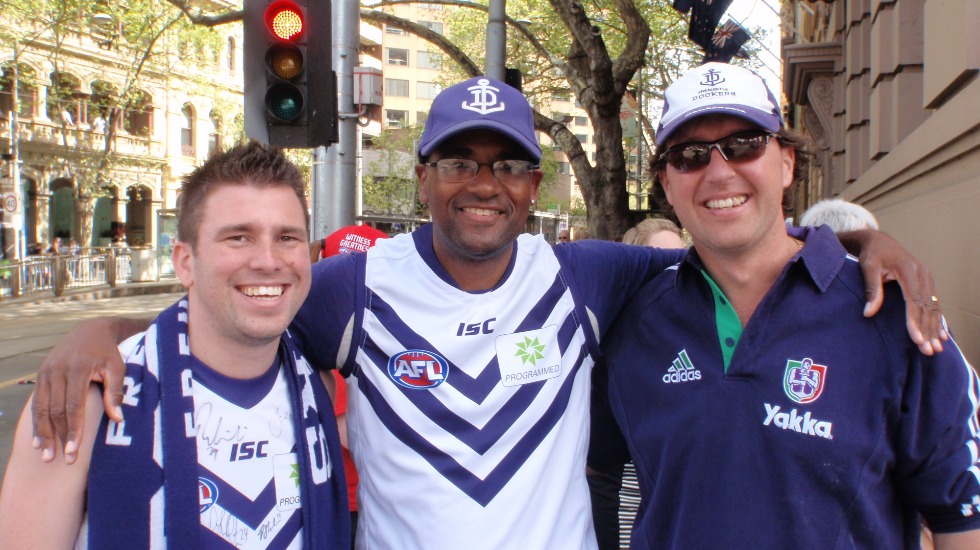
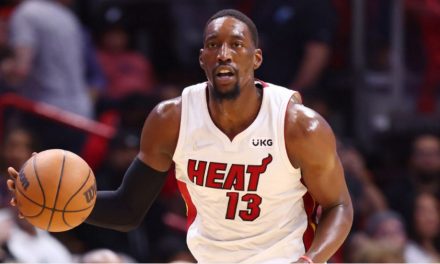
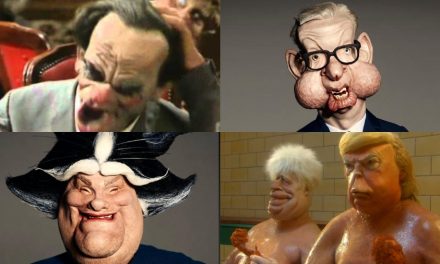
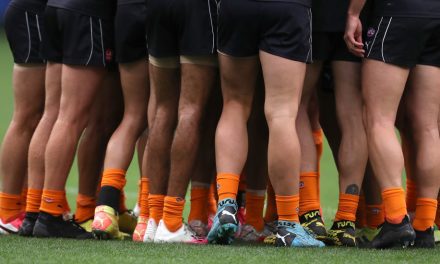
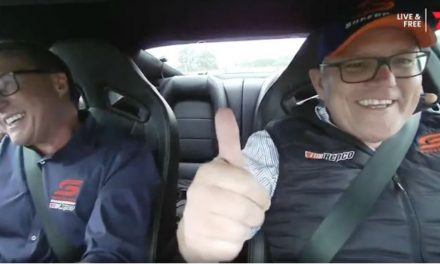

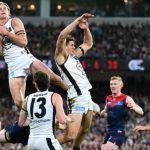
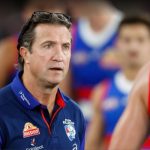



Hey Gil, Good story about a bad situation. Please stop calling it “unconsious racial bias”. The racism is very real also present here in Australia.
From an old “white” Eagles supporter
Cheers, Peter